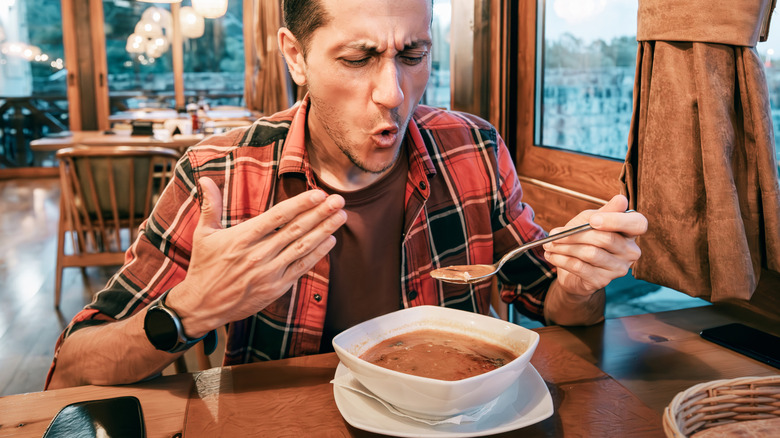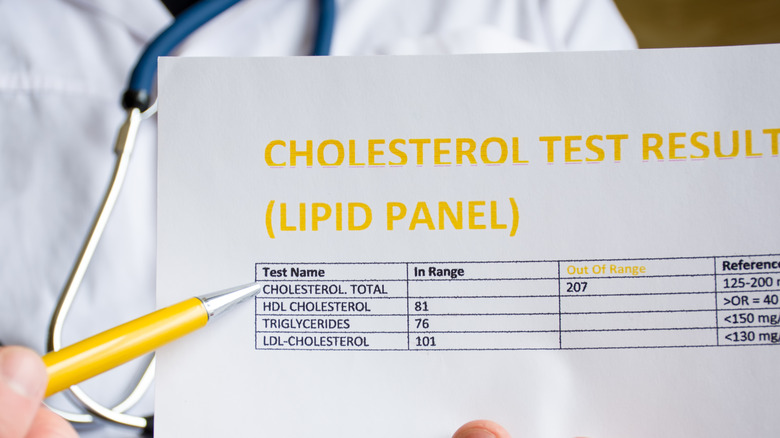Eating Cayenne Pepper Has An Unexpected Effect On Your Cholesterol
Taking medicine isn't the only way you can combat rising cholesterol levels. There are healthy habits that can lower your high cholesterol, which may include eating cayenne pepper.
If you regularly nosh on spicy food, you know that cayenne pepper brings on the heat. In fact, it's a go-to spice in plenty of flavorfully hot dishes. The ingredient that causes its five-alarm hotness is why cayenne pepper is a favorite among people who want to control their cholesterol with food. At the heart of cayenne pepper's heat is capsaicin, a substance that has shown some cholesterol-lowering prowess under clinical conditions (which is among the many things that can happen to your body when you eat spicy foods).
A 2022 review in Frontiers in Nutrition determined that capsaicin could potentially affect cholesterol in positive ways for individuals with metabolic syndrome, a condition linked to a higher risk of cardiovascular disease. After analyzing the findings of nine trials, the authors concluded that ingesting capsaicin could decrease overall cholesterol and "bad" low-density lipoprotein (LDL) cholesterol.
Bypass bad cholesterol buildup
When Dr. Zhen-Yu Chen was interviewed in 2012 about a study his team conducted on hot chili peppers, he said that capsaicin appeared to both reduce cholesterol buildup and sweep more of it out of the body (per Science Daily). As a result, cholesterol had less time to adhere to artery walls and cause future damage.
Capsaicin may be able to lift lagging "good" high-density lipoprotein (HDL) cholesterol as well as tame rising LDL cholesterol. In a 2017 trial (via Nutrients), participants who consumed 4 milligrams of capsaicin twice a day raised their HDL cholesterol over three months. In contrast, participants in the control group — who consumed capsules with only 0.05 milligrams of capsaicin — did not experience the same benefit.
A 2018 study in the Journal of Functional Foods reached a similar conclusion about the connection between capsaicin and low cholesterol readings. After regularly ingesting moderate (4.4-milligram) doses of capsaicin, participants exhibited decreased LDL cholesterol levels. Thus, capsaicin could assist in reducing death from diseases like heart attacks and hardening of the arteries (which is among the causes of heart attacks). But before you run out to buy a tub of cayenne pepper, be forewarned that more isn't better, at least in the case of capsaicin. When participants in the 2018 study took in high (16.7 milligrams per day) levels of capsaicin, they stopped enjoying the chemical's cholesterol-friendly effects.
Feel the heart-friendly burn
If you like the idea of using cayenne pepper as a cholesterol-lowering tool, you don't have to wait until the next time you make chili. Cayenne pepper can be used to spruce up a variety of dishes, including some that may surprise you. After all, you might not be shocked to hear that cayenne pepper livens Mexican rice. But if you're feeling adventurous, cayenne pepper can also spice up desserts like chocolate ganache.
Of course, you might be one of those people who prefers mild seasonings without a ton of scorch. In that case, consider trying a capsaicin supplement. Just be aware that you might still feel the burn, even if you're taking a pill. Capsaicin supplements may cause gastrointestinal discomfort until your body adjusts to them, so it's wise to be cautious with your dosage — and to get advice from a medical professional before you incorporate such supplements into your daily regimen.



